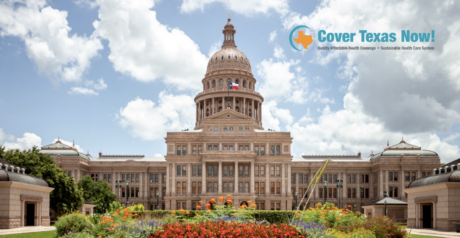
Episcopal Health Foundation has joined 187 other Texas organizations in signing a new letter that urges state leaders to provide a health insurance option for low-wage Texas adults.
A wide spectrum of philanthropic leaders, physicians, health care providers, local officials, business leaders, and advocates signed the letter to Gov. Greg Abbott, Lt. Gov. Dan Patrick, House Speaker Dade Phelan, and members of the Texas Legislature.
“Texas has the means to make health insurance coverage a reality for more than 1 million low-income Texans. State leaders hold the keys. How can we look these families in the eyes, knowing what we know, and say we just decided not to do anything about it?” says EHF’s CEO Elena Marks.
The letter notes that there are only a few weeks left in the legislative session.
“We specifically support a coverage initiative that is bipartisan, funded through available federal dollars, structured to be neutral for the state’s budget, and designed to meet Texas’ specific needs, values and circumstances,” the groups wrote.
“I’ve been working on health care at the Legislature for many years, and I can’t remember seeing so many organizations from across Texas all come together like this to urge state leaders to expand health coverage,” said Dr. Laura Guerra-Cardus, Deputy Director of Children’s Defense Fund – Texas. “This is a clear message that state leaders should use the remainder of the legislative session to pass a plan that ensures child care workers, home health aides, grocery clerks, and other Texans with low-wage jobs — including hundreds of thousands of essential workers — finally have a health insurance option.”
As the letter notes, Texas is one of just 12 states where adults with jobs below the poverty line (a monthly income of about $1,800 per month for a single parent with two children) typically do not have an affordable health insurance option. Texas currently limits Medicaid health insurance to children, pregnant women, seniors, Texans with serious disabilities, and a very small number of parents in extreme poverty (a monthly income below $320 for a single parent with two children).
The letter points out that the federal government is offering to pay for 90 percent of the costs of increasing health coverage. The remaining 10 percent could be paid for through budget savings and other options, ensuring the plan creates no net cost for the state.
Background information from Cover Texas Now on recent health coverage discussions at the Legislature:
-
One way for the Legislature to expand health coverage is through Senate Bill 117/House Bill 3871, filed by Senator Nathan Johnson and Rep. Julie Johnson, to develop a Live Well Texas program modeled on Medicaid waivers implemented in other conservative states. The bill has several House Republican co-authors and sponsors. Another way to expand health coverage is through a traditional Medicaid expansion, as legislators have proposed through numerous bills this session. No hearings have been scheduled yet on the Medicaid expansion bills or the Live Well Texas bills.
-
There has been greater discussion about expanding health coverage since Friday’s announcement by the federal government that it is rescinding a decision made in the final days of the Trump administration to extend uncompensated care funding for Texas hospitals under a Medicaid waiver. The Trump administration’s decision would have locked down until the year 2032 what was intended to be a temporary hospital funding stream to cover the costs of treating the high number of uninsured patients in Texas. Federal officials explained that the decision by the Trump Administration, coming five days before the inauguration, was made without the public notice or input that is expected under federal rules. Organizations in the Cover Texas Now coalition have pointed out that if the Legislature expands health coverage, it would reduce — but not eliminate — the need for that hospital funding to cover the unpaid bills of uninsured patients and provide billions in health care funding to Texas. (The letter from the 188 organizations was completed prior to Friday’s announcement by the federal government.)
-
Last week, the Texas House passed several widely supported health care bills. Those bills have been sent to the Texas Senate for consideration. While numerous members of the Cover Texas Now coalition support several of those bills, it is important to note that none of those bills expands eligibility for health coverage beyond those Texans who are already eligible.